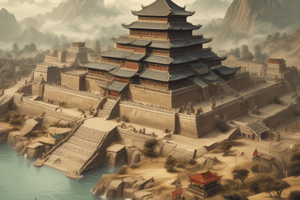Podcast
Questions and Answers
Which early human society used the 'tribal chief' system for governance?
Which early human society used the 'tribal chief' system for governance?
- Greeks
- Indigenous peoples (correct)
- Sumerians
- Egyptians
In ancient Sumer, what form of government was used?
In ancient Sumer, what form of government was used?
- Oligarchy
- Monarchy (correct)
- Republic
- Democracy
Which ancient civilization invented the concept of a powerful ruler known as a pharaoh?
Which ancient civilization invented the concept of a powerful ruler known as a pharaoh?
- Persians
- Egyptians (correct)
- Romans
- Greeks
In a republic, where does the governmental power typically reside?
In a republic, where does the governmental power typically reside?
Which government structure is characterized by a small group of powerful individuals governing the society?
Which government structure is characterized by a small group of powerful individuals governing the society?
What form of government is exemplified by one person wielding absolute power as the ruler?
What form of government is exemplified by one person wielding absolute power as the ruler?
What distinguishes a constitutional republic from other forms of government?
What distinguishes a constitutional republic from other forms of government?
Which philosopher emphasized the separation of powers and the rule of law, influencing the creation of the U.S. Constitution?
Which philosopher emphasized the separation of powers and the rule of law, influencing the creation of the U.S. Constitution?
What is a key feature of direct democracies?
What is a key feature of direct democracies?
What modern development has allowed citizens to interact with their government through digital channels?
What modern development has allowed citizens to interact with their government through digital channels?
Which ancient society developed an advisory council known as the senate?
Which ancient society developed an advisory council known as the senate?
What governmental institution evolved from the Magna Carta to become an independent legislative body?
What governmental institution evolved from the Magna Carta to become an independent legislative body?
Flashcards are hidden until you start studying
Study Notes
Discovering the Past and Understanding Present-Day Government Structures
Throughout history, societies have devised a variety of ways to govern themselves, each with its own unique set of strengths and challenges. In this exploratory dive into the world of History and Civics, we'll delve into the evolution of government structures, from ancient societies to contemporary systems.
Early Government Structures
Early human societies developed various forms of government to manage their communities. For instance, the tribal chief system was prevalent among indigenous peoples, where a leader made decisions on behalf of the tribe. The Sumerians, an ancient civilization, used a monarchy with a king as the sole ruler. The Egyptians invented the pharaoh – a powerful ruler who was also a priest and a military leader.
Fundamental Forms of Government
Over time, three fundamental forms of government emerged:
- Monarchy: One person wields absolute power as the ruler, such as the British monarchy or the monarchies of the Middle East.
- Republic: A group of people – typically a legislative assembly – holds the governmental power, as seen in the United States and France.
- Oligarchy: A small group of powerful individuals governs the society, like the original Athenian Council of Five Hundred or today's governments in Singapore and Brunei.
Constitutional Republics and Democracy
A subtype of republics is the constitutional republic, where governmental powers are divided into separate branches and the rule of law is based on a written constitution, such as the United States of America and Switzerland. In such systems, citizens enjoy certain rights and freedoms, and the government is held accountable through regular elections.
Democracy is a particular form of government that emphasizes the participation of the people, such as through voting in elections or participating in public referendums. In direct democracies, citizens directly vote on laws and policies, as seen in ancient Athens and some modern-day municipalities. In representative democracies, citizens elect representatives to make decisions on their behalf, as seen in most modern-day countries.
Evolution of Government Structures
Over the centuries, government structures have evolved to better address societal needs and aspirations. For example, ancient Rome developed the senate as an advisory council to their monarchy, while the British Parliament evolved from the Magna Carta to an independent legislative body.
The 18th-century Enlightenment philosophers, such as John Locke, Montesquieu, and Rousseau, believed in the importance of the separation of powers and the rule of law. Their ideas laid the foundation for the creation of the U.S. Constitution, which has inspired many other countries to establish constitutional republics.
Governmental Institutions and Modern Challenges
Today, governments are tasked with addressing complex issues, such as climate change, income inequality, and globalization. These challenges require governments to adapt and innovate to meet the needs of their citizens.
For example, the rise of digital technology has led to the development of e-governance, where citizens can interact with their government through digital channels. This innovation has facilitated better communication and service delivery, but it also raises concerns about data privacy and security.
Conclusion
Historical and contemporary government structures show us the diverse ways societies have attempted to ensure their well-being. By understanding the evolution of government structures through history, we gain valuable insights into our current systems and how they can be improved to better address the challenges of the present and future. Always remember, the goal of civics education is to equip individuals with the knowledge to become informed, engaged, and responsible citizens in their communities.
Studying That Suits You
Use AI to generate personalized quizzes and flashcards to suit your learning preferences.




